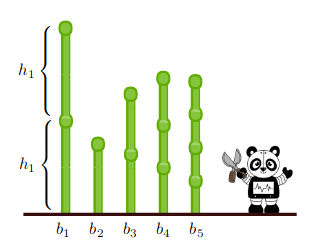| The Bamboo Garden Trimming Problem - Fun CS Theory |
| Written by Mike James | |||
| Sunday, 18 September 2022 | |||
|
Today is World Bamboo Day which, since 2009, is observed on September 18 in order to raise awareness about the conservation of this extremely useful plant. It reminded me of an algoritrhmic puzzle, the Bamboo Garden Trimming (BGT) problem, also known as the Robot Panda problem. Note: This article previously appeared in May 2020 as The Robot Panda Problem - Fun CS Theory What is special about this problem it is that it is easy to state and understand and very approachable whether you are an amateur or a serious computer scientist.
The problem, as stated in a paper with the title Cutting Bamboo Down to Size is: "You just bought a house by a lake. A bamboo garden grows outside the house and obstructs the beautiful view of the lake. To solve the problem, you also bought a robotic panda gardener which, once per day, can instantaneously trim a single bamboo. You have already measured the growth rate of every bamboo in the garden, and you are now faced with programming the gardener with a suitable schedule of bamboos to trim in order to keep the view as clear as possible" Well, your first thought might be what a useless robotic panda to only be able to cut one bamboo per day - this was certainly Harry Fairhead's first comment but then he is our IoT, hardware and robotics guy! Try explaining to a practical man that pure algorithms are worth studying. Does it sound any more impressive expressed formally? The garden contains n bamboos b1,...,bn, where bamboo The task is to construct a cutting algorithm that keeps the tallest bamboo as short as possible.This maximum height is called the makespan. Notice the overall growth rate of the garden is 1 and this means that the makespan has to be at least 1 - can you prove this? What is more there are simple cases where it can be arbitrarily close to 2 - what cases? After these preliminary observations we can start inventing algorithms to produce optimal makespans. This is where things get interesting: Two natural strategies are Reduce-Max and Reduce-Fastest(x). The paper goes on to prove some new upper bounds for both algorithms - read it to find out. It then goes on to examine the time and space demands of the algorithms. This is a really nice computer science problem that is interesting in its own right and makes a great example to introduce CS thinking. It might even hide an idea for a game within its workings - Angry Pandas? Let me know if you write it. If you would like to see an interactive simulation then visit: Bamboo Garden Trimming
More InformationCutting Bamboo Down to Size Related ArticlesNew Game Dots And Polygons Is NP Hard LZ Compression And The One-Bit Catastrophe Best Laid Plans of Lions and Men To be informed about new articles on I Programmer, sign up for our weekly newsletter, subscribe to the RSS feed and follow us on Twitter, Facebook or Linkedin.
Comments
or email your comment to: comments@i-programmer.info |
|||
| Last Updated ( Sunday, 18 September 2022 ) |



